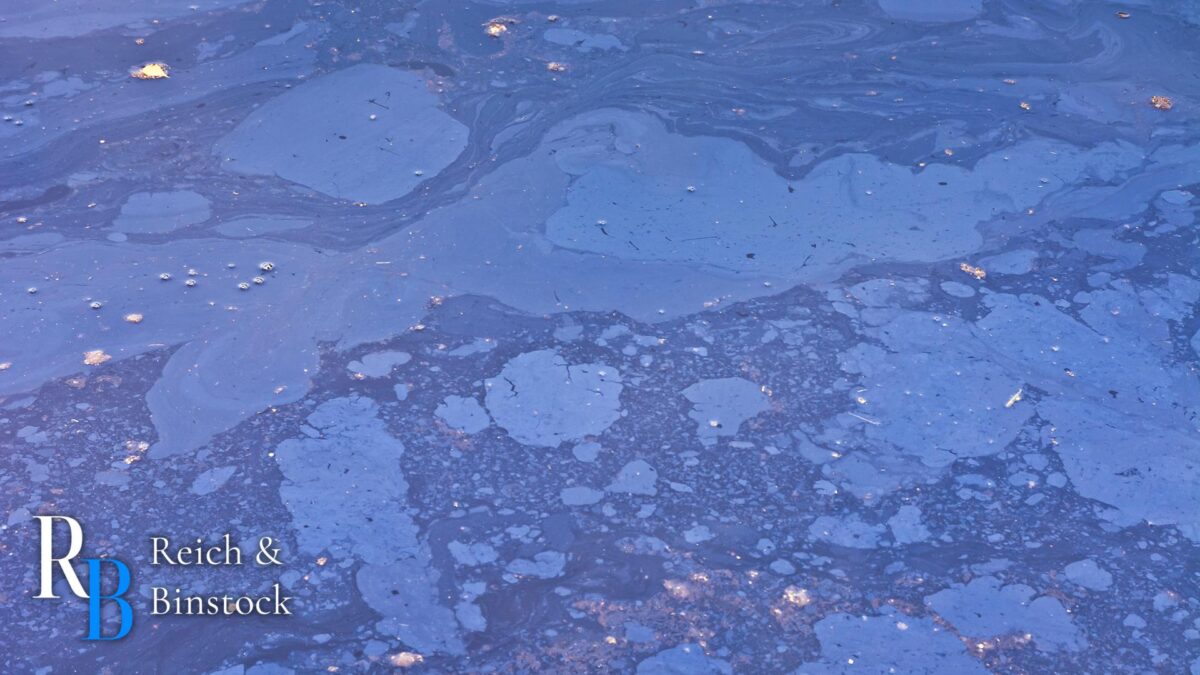Over 30 years, thousands of military personnel and their families suffered exposure to harmful toxins and carcinogens due to the Camp Lejeune water contamination. Since then, many military veterans and their families who lived at Camp Lejeune have been diagnosed with various cancers and other serious health conditions. As more Camp Lejeune residents and family members begin filing lawsuits, the question has come up, “How much is a Camp Lejeune lawsuit payout per person?”
The experienced attorneys from Reich & Binstock will answer that question in the latest blog post and provide an update on the Camp Lejeune litigation process.
If you have grounds to file a Camp Lejeune lawsuit, the attorneys at Reich & Binstock are ready to help. To schedule a free consultation with one of our Camp Lejeune lawyers, call Reich & Binstock at (713) 622-7271 today.
Were You Affected by the Water Contamination at Camp Lejeune?
If you or a loved one lived or worked at the Camp Lejeune military base between 1953 and 1987, you could participate in the ongoing Camp Lejeune water contamination cases. Over those 30 years, the Camp Lejeune water supply was contaminated by chemicals and other toxic materials. This led to various health complications and illnesses.
Many military personnel and their family members have received diagnoses for different forms of cancers and medical conditions related to the harmful chemicals in Camp Lejeune’s drinking and bath water.
Some older individuals affected by the contaminated water may have passed before the passing of the Camp Lejeune Justice Act. However, family members and children are still able to pursue Camp Lejeune water contamination lawsuits.
What Is the Status of the Camp Lejeune Lawsuit?
As of September 2023, a timeline still hasn’t been released for Camp Lejeune lawsuit payouts from claims already filed. Due to the complex nature of this type of lawsuit, many attorneys and government officials are unsure how long the Camp Lejeune legal battle will continue.
In April 2023, North Carolina judges ordered attorneys representing Camp Lejeune victims to nominate a team of leaders. This team will be responsible for gathering information, handling complaints, and ensuring fair Camp Lejeune settlement amounts are awarded to all victims.
What Is the Camp Lejeune Lawsuit About?
The Camp Lejeune lawsuit is the legal action that families affected by the water contamination have been able to file in order to recover compensation. For 30 years, the Camp Lejeune water supply was contaminated by chemicals. The chemicals found in the contaminated water are known carcinogens linked to various cancers, birth defects, and other health complications.
In 2009, many former Camp Lejeune residents began filing lawsuits under the Federal Tort Claims Act in order to recover compensation for the cancers and health conditions they had developed due to the contaminated drinking water at Camp Lejeune. Those lawsuits were consolidated into a class action lawsuit in 2012. However, they were dismissed because of North Carolina’s ten-year statute of repose.
Finally, in 2022, President Joe Biden passed the Camp Lejeune Justice Act into federal law. This allowed military personnel and their families who lived at Camp Lejeune the ability to recover compensation for healthcare and disability expenses related to the water contamination at the military base.
The Camp Lejeune Justice Act was passed as part of the larger PACT Act. It is also called the Sergeant First Class Heath Robinson Honoring Our Promise to Address Comprehensive Toxics Act of 2022. Prior to the passing of the PACT Act, veterans exposed to the harmful toxins in Agent Orange, burn pits, radiation, and other toxic substances were unable to receive disability and healthcare benefits for their injuries.
What Caused the Water Contamination at Camp Lejeune?

Camp Lejeune, a military base in Jacksonville, North Carolina, was home to 170,000 individuals following its construction in 1941. The Camp Lejeune population was made up of current military members, military family members, civilians, employees, and retirees.
The Camp Lejeune water contamination began in 1953 when chemicals from a dry cleaner across the street from the military base leaked into the drinking water supplied by the Tarawa Terrace water treatment plant. Water at Camp Lejeune was provided by three water treatment plants – Tarawa Terrace, Hadnot Point, and Holcomb Boulevard.
In 1979, the water contamination at Camp Lejeune continued when 20,000 to 30,000 gallons of oil beneath Hadnot Point seeped into the ground and water supply. Following the oil leak under Hadnot Point, two of three water treatment plants supplying water to Camp Lejeune were contaminated.
The first reports about Camp Lejeune water contamination began in 1981 following an investigation by Marines from the U.S. Army Environmental Hygiene Agency. They found chlorinated hydrocarbons in the drinking water and warned the Marine Corps of their findings and the dangers associated with those chemicals.
Following the tests by the U.S. Army Environmental Hygiene Agency, the U.S. Marine Corps ordered their own tests that were conducted by Grainger Laboratories in 1982. During their tests, Grainger Labs found human carcinogens in the Hadnot Point drinking water.
Employees from the lab warned officials at Camp Lejeune about the dangers of the toxins found in the drinking water, but the warnings were ignored. It wasn’t until 1985 that all the water wells that supplied water to Camp Lejeune were finally shut down.
What Injuries Have Been Linked to the Water at Camp Lejeune?
Many health conditions and injuries have been linked to the contaminated water at Camp Lejeune. The volatile organic compounds found in the water have been linked to several types of cancer and other serious health conditions.
Toxins like mercury, benzene, toluene, vinyl chloride, perchloroethylene (PCE), and Trichloroethylene (TCE) are some of the volatile organic compounds discovered in the water that was supplied to Camp Lejeune.
The contaminated drinking water at Camp Lejeune has been associated with many different forms of cancer. Some of the cancers that have been linked to the Camp Lejeune water contamination are
- Childhood cancers
- Bladder cancer
- Leukemia
- Breast cancer
- Kidney cancer
- Liver cancer
- Esophageal cancer
- Lung cancer
- Ovarian cancer
- Non-Hodgkin’s lymphoma
- Multiple myeloma
- Prostate cancer
- Cervical cancer
- Colorectal cancer
In addition to various cancers, Camp Lejeune victims have also been diagnosed with other health conditions like:
- Cardiac conditions
- Parkinson’s disease
- Aplastic anemia
- Miscarriages
- Infertility
- Birth defects like spina bifida, congenital heart defects, anencephaly, cleft lip/palate, and more.
- Amyotrophic Lateral Sclerosis (ALS)
- Kidney damage and failure
- Myelodysplastic syndrome (MDS)
- Fatty liver disease
- Hepatic steatosis
- Neurological and mental issues
- Scleroderma
How to File a Claim for the Camp Lejeune Water Contamination
Those seeking to file a Camp Lejeune settlement claim should hire a skilled Camp Lejeune lawyer. Working with Reich & Binstock can help you navigate this complicated legal process and improve your chances of recovering the maximum Camp Lejeune water contamination settlement amounts.
To begin the Camp Lejeune claim process, gather all necessary documentation that could support your case. This includes medical records with diagnoses of any diseases linked to the Camp Lejeune water contamination. It’s essential to have comprehensive medical documentation to provide evidence of the contamination’s impact on your health.
Along with medical records, collect any documentation that verifies your presence or the presence of a loved one at Camp Lejeune during the contamination period, which spanned from the 1950s to the 1980s. Service records, housing assignments, or official documentation can help prove one’s location during the specified period.
Once you’ve collected the necessary documents, you and your attorney from can initiate the filing process. Depending on the circumstances, a claim may be filed through the Tort Claims Unit or Navy JAG. Your attorney will ensure your claim is filed with the appropriate channel to be processed correctly.
During this process, you must complete the Camp Lejeune Justice Act claim form. This form asks for details regarding your health, your time at Camp Lejeune, and the extent of your exposure to the contaminated water. Filling out this form with as much accuracy and detail as possible is vital.
After filling out the form, email or mail it to the specified address. It’s wise to save a copy of the claims form and any correspondence related to the claim for future reference.
If the Camp Lejeune claim is not settled or adjudicated in six months, individuals can file a lawsuit at the United States District Court for the Eastern District of North Carolina.
Who Qualifies to File a Camp Lejeune Lawsuit?
Military veterans and their family members who meet the following criteria may be able to pursue a Camp Lejeune lawsuit.
- A military service member who served or was based at Camp Lejeune Military Base or Air Station New River for at least 30 days between 1953 and 1987;
- A family member of a military service member stationed at Camp Lejeune or Air Station New River for at least 30 days between 1953 and 1987;
- The military member was not dishonorably discharged, and
- You’ve been diagnosed with one of the cancers or health conditions associated with the Camp Lejeune toxic water.
The oldest Camp Lejeune victims would be in their late 80s or older, but family members can still file a Camp Lejeune lawsuit on their behalf. Many children were born and lived on the base during the Camp Lejeune water contamination timeline and are eligible to participate in the Camp Lejeune cases.
The children who lived on base may be struggling with health complications they may not realize are associated with their time living at Camp Lejeune. If you believe that your cancer or health condition is related to the toxic Camp Lejeune water, contact the attorneys at Reich & Binstock today.
What Is the Average Camp Lejeune Lawsuit Payout Per Person?

The Camp Lejeune water contamination settlement amounts will vary based on several factors like the severity of the person’s illness, the amount of time they lived at Camp Lejeune, and more. While some victims may receive tens of thousands in compensation, others may receive hundreds of thousands. It is also possible for a victim to receive over a million dollars in compensation, but only in severe cases.
The Camp Lejeune lawsuit payout amounts are just estimates since the actual payout amounts won’t be known for several more years. The estimates are based on the budget created by the Congressional Budget Office (CBO).
When you work with an experienced Camp Lejeune settlement attorney from Reich & Binstock,
you can increase your chances of recovering higher Camp Lejeune settlement payouts than if you were to handle your Camp Lejeune water lawsuit alone.
What Factors Will Affect the Camp Lejeune Payout Per Person?
The Camp Lejeune payout per person is not a uniform amount, as it is influenced by many factors that vary from one individual to another. When determining the amount of a person’s Camp Lejeune lawsuit settlement, the federal court system will evaluate many circumstances surrounding the person’s illness.
Level of Exposure
One of the key factors that can affect a person’s Camp Lejeune settlement is the level and duration of their exposure to the contaminated water. Camp Lejeune victims exposed to the toxic water for longer periods are more likely to receive higher water contamination settlement amounts than victims exposed for a shorter time.
You must provide your Camp Lejeune attorney with evidence proving that you lived or worked on the base between 1953 and 1987 and were there longer than 30 days. The longer you were at Camp Lejeune, the more likely you were exposed to the contaminated water and have since suffered medical conditions related to the toxic water.
Severity of Injuries

The severity of a person’s injuries will also greatly determine the victim’s Camp Lejeune water settlements. For example, medical conditions like Parkinson’s disease and brain cancer are more likely to receive higher Camp Lejeune payout amounts. Even individuals with minor health conditions can still recover Camp Lejeune payouts, but they won’t be as much as those with more severe conditions.
The compensation awarded in the Camp Lejeune water settlements is significantly affected by the magnitude and long-term impact of the victim’s health issues. Since more severe medical conditions often lead to greater medical expenses, prolonged treatments, and possibly lifelong impairments, this warrants higher compensations to cover these medical costs and hardships adequately.
Conditions like Parkinson’s disease and brain cancer, for instance, are life-altering and can also be debilitating. The long-term medical care, therapy, medications, and potential loss of income or work capabilities associated with such conditions justify larger settlement amounts.
On the other hand, while individuals who have minor or less severe medical issues resulting from the Camp Lejeune water contamination are entitled to compensation, their settlement amounts might be lower. This is because their medical bills, ongoing treatments, and overall life disruptions may not be as extensive as those suffering from major health conditions.
Nonetheless, every Camp Lejeune water contamination victim has a right to seek justice and compensation, regardless of the severity of their health condition. The Camp Lejeune settlements are designed to reflect the extent of each victim’s personal and economic impact.
Economic Damages
Since Camp Lejeune claims are considered civil claims, victims can receive compensation for the losses related to their exposure to the contaminated water. Economic damages, a primary element of these claims, quantify the tangible financial losses that victims have suffered.
Concerning the Camp Lejeune water contamination, economic damages encompass a wide range of financial burdens, like medical bills, diagnostic fees, medications, and more.
Another economic damage that one can recover from a Camp Lejeune settlement is lost wages. Some victims may have missed considerable work due to illness, while others might have seen their earning capacities permanently diminished by chronic conditions.
To ensure that your Camp Lejeune settlement payout reflects the depth of your financial hardships, it’s important to collect detailed documentation of your medical bills, medical treatments, and other costs related to your illness. Even pay stubs reflecting lost wages can help increase the settlement amount from your Camp Lejeune lawsuit.
Non-Economic Damages
Non-economic damages are harder to assign a monetary amount. These damages don’t have clear-cut bills or receipts; they come from the emotional and psychological effects of an illness caused by exposure to the toxic Camp Lejeune water.
Our skilled Camp Lejeune attorneys will evaluate your claim and work towards assigning your non-economic damages a monetary value. We understand how emotional and psychological side effects can impact a person and can present them in legal settings. Your Camp Lejeune attorney will consult with psychological experts to assign a monetary amount to your non-economic damages.
Amount of Evidence That Proves Exposure, Injuries, and Damages
Camp Lejeune lawsuits will be heavily influenced by the amount of evidence you can present during litigation. The more proof that your medical condition and injuries were related to the time you lived or worked at Camp Lejeune, the more you can increase your payout.
The Camp Lejeune attorneys at Reich & Binstock will compile the evidence provided and use it to build a strong case proving that your medical condition was caused by exposure to the contaminated Camp Lejeune water.
How Will the Government Calculate Camp Lejeune Settlements?
The Congressional Budget Office (CBO) estimated they will spend over $6 billion on Camp Lejeune claims. The federal government will likely create a grid or matrix system when evaluating Camp Lejeune cases and their settlement amounts. This grid system should allow the Federal Court to provide Camp Lejeune settlement payouts while removing any political influences, gender bias, and racial discrimination.
Grid systems are common in large mass tort settlements. Using this system, the federal government will assess many circumstances surrounding an individual’s claim to calculate their Camp Lejeune settlement amounts.
One important consideration that the government will evaluate is the nature and severity of the health conditions associated with a person’s exposure to the Camp Lejeune water contamination. Anyone diagnosed with more debilitating or chronic conditions may be eligible for higher compensation.
Another important factor in determining an individual’s Camp Lejeune payout amount is the length of time that they lived or worked on base. The longer a person suffered exposure to the contaminated water, the potentially larger their settlement might be.
Economic factors will also play a role, such as the medical expenses affected individuals incur and any lost wages due to their health issues. The government may also consider non-economic damages, which cover aspects like pain, suffering, and any reduction in the quality of life.
It’s worth noting that while the government may establish criteria for calculating settlements, they will assess each claim on its own, and individual outcomes can vary based on the specifics of each case.
When Will Compensation for the Camp Lejeune Lawsuits Be Determined?
According to the Camp Lejeune Justice Act, families that file a claim can file a lawsuit if their claim has not resolved in six months. In February 2023, many Camp Lejeune victims began filing lawsuits since February marked six months from their initial lawsuit filing.
Since February, over 45,000 Camp Lejeune claims have been filed, but so far, there is no end in sight for those waiting to receive their settlements.
Have Any Camp Lejeune Claims Settled Yet?
As of September 2023, no one has received a settlement of their Camp Lejeune claim. Many officials expect the first round of Camp Lejeune payouts to begin at the end of 2023. Individuals could start filing Camp Lejeune claims in August 2022, so it’s unsurprising that no payouts have occurred yet.
There have not been legal proceedings of this magnitude against the federal government in United States history. Due to these unprecedented circumstances, much remains to be determined.
Why Should I Hire a Camp Lejeune Lawyer?

Hiring a Camp Lejeune lawyer is essential if you or a loved suffered from the issues surrounding the Camp Lejeune water contamination. Our attorneys have years of experience handling cases under the Federal Tort Claims Act and understand the complexities of litigating cases of this magnitude.
Individuals without legal knowledge most likely cannot handle cases at this level. So, we recommend that you work with an experienced Camp Lejeune attorney. Your legal team will be able to stay on top of any deadlines for your case. We will swiftly handle any legal obstacles that may get in the way.
A Camp Lejeune water lawsuit hinges on the amount of evidence you provide your attorney and their experience. Suppose your medical condition is not as serious as brain cancer or Leukemia. You still deserve compensation for your illness and injuries caused by exposure to the Camp Lejeune water supply. The Camp Lejeune lawyers at Reich & Binstock will fight for your rights and recover maximum compensation.
Maximizing Your Camp Lejeune Settlement Amounts
Working with a Camp Lejeune attorney can increase your chances of recovering full compensation. You can recover damages from years of contaminated water exposure. Your attorney will work with you to gather evidence. Examples of evidence include medical bills, treatments, lost wages, proof of residency, and more to build a strong case.
At Reich & Binstock, our attorneys understand the legislative nuances that apply to Camp Lejeune lawsuits. We will ensure no potential avenue for compensation is missed. Your Camp Lejeune attorney can advocate vigorously through skilled negotiation, ensuring you receive the maximum settlement possible.
Have a Better Understanding of the Legal Process
Camp Lejeune litigation requires extensive knowledge of the Federal Tort Claims Act. Those filing Camp Lejeune lawsuits are essentially going against the United States government. This can be overwhelming if you navigate this legal process alone.
The Camp Lejeune Justice Act became federal law in 2022. Since then, the laws and regulations surrounding Camp Lejeune lawsuits have changed several times. The attorneys at Reich & Binstock have remained current on the latest updates to these laws. This is to serve their clients better as they help them recover Camp Lejeune settlements.
Filing Your Claim on Time
Working with our Camp Lejeune attorneys is crucial to ensuring your claim is filed promptly. The legal landscape surrounding Camp Lejeune litigation is intricate. It involves specific deadlines and statutes of limitations that you must follow. Filing your Camp Lejeune lawsuit after the August 10, 2024, deadline can forfeit your right to compensation.
Your Camp Lejeune attorney from Reich & Binstock will provide guidance on required documents and evidence for your Camp Lejeune lawsuit. We will keep track of important dates critical to your case.
Why Should I Choose Reich & Binstock for My Camp Lejeune Claim?
The Camp Lejeune lawyers at Reich & Binstock are familiar with the complex legal process that these lawsuits involve. It can be overwhelming to join such a big legal battle like the Camp Lejeune water contamination lawsuits. Your attorney from Reich & Binstock will provide unique care to help alleviate any stress or hesitations you have.
Reich & Binstock has represented countless clients throughout the Houston area in big and small litigations. You can trust that your Camp Lejeune lawyer will answer your questions, provide case updates, and protect your interests.
Contact Reich & Binstock Today for Your Camp Lejeune Lawsuit
If you suspect that exposure to harmful chemicals in the Camp Lejeune water caused your cancer or serious medical condition, you might have grounds to file a Camp Lejeune lawsuit.
The deadline for Camp Lejeune claims is August 10, 2024. While that date is under one year away, it will be here before you know it. To begin your Camp Lejeune claim filing process, contact the attorneys at Reich & Binstock today by calling (713) 622-7271.













